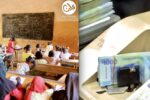A parallel government under the RSF and the role of Taqqadum
2 January 2024
A recent Reuters report revealed that a new civilian-led government is likely to be declared soon in areas of Sudan controlled by the paramilitary Rapid Support Forces (RSF). A coalition of Sudanese politicians, including two former members of the Sovereignty Council following the 2019 revolution, Mohamed al-Taishi and al-Hadi Idris, is preparing to declare the new government in the coming days. The RSF has expressed willingness to collaborate with the proposed administration, according to the report.
The proposal for a civilian-led government in RSF-controlled areas reflects a broader political strategy that traces back discussions among figures associated with former prime minister Abdalla Hamdok’s administration. Within coalition meetings, it has become evident that the success of this initiative hinges on the support of key political groups like the civilian-led power coalition, Taqqadum (meaning “progres”). The initiative will try to leverage Taqqadum’s political network and influence to garner both local and international legitimacy amidst the ongoing conflict, analysts say.
This development stems from months of ongoing discussions following the outbreak of war in Sudan in April 2023. A political source disclosed to Ayin that tensions flared during a recent Taqqadum meeting in Uganda between supporters and opponents of the proposal. While influential Taqqadum members such as the political secretary of the Democratic Unionist Party (DUP), Ibrahim Mirghani, strongly supported the proposal, others, such as members of the Sudanese Congress Party and Umma Party, remain opposed to it.
In a bid to preserve coalition unity, Abdallah Hamdok, the former prime minister and the head of the coalition, established a committee to review the proposal. However, this effort failed to satisfy factions backing the plan, reportedly prompting them to meet with the deputy commander of the paramilitary Rapid Support Forces (RSF), Abdelrahim Daglo, in Nairobi, for further discussion of the proposal.
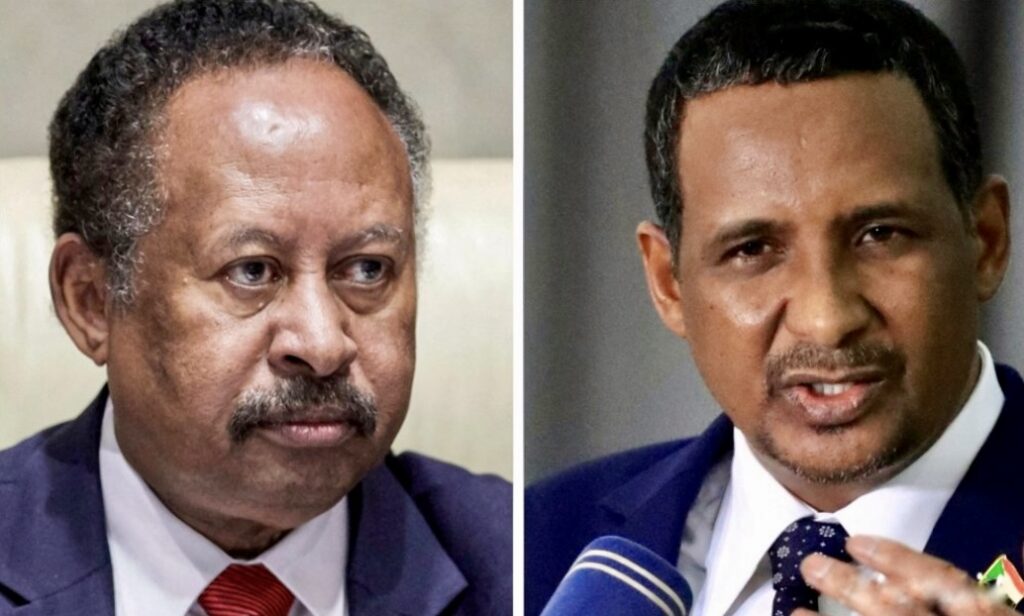
Taggadum, RSF
Taqqadum faced intensified scrutiny when its representatives met with the paramilitary Rapid Support Forces (RSF) commander Mohamed Hamdan Dagalo (popularly known as “Hemedti”) in Addis Ababa at the beginning of the year. This meeting led to the signing of a political-humanitarian agreement between Taqqadum and the Rapid Support Forces. While Taqqadum claimed the initiative aimed to mediate between the warring factions, the Sudanese Armed Forces (SAF) rejected the effort.
“The second of January agreement signed by Hemedti and Hamdok helped solidify the minds of many on the relation between Taqaddum and the RSF, whether it’s true or not,” said Kholood Khair, the director of the Sudanese think tank, Confluence Advisory.
Dallia Abdelmoniem, a political commentator and analyst, says the optics of the meeting with Hemedti and the UAE’s role with both the RSF and Taqqadum explain why many believe the civilian block is more pro-RSF. While Abdelmoniem does not believe Taqqadum is entirely aligned with the RSF, she emphasised the damage these associations have caused. “Do I think Taqqadum is wholey RSF? No, but I think their actions and statements have harmed them as a political civilian body.”
A few months after the 2 January 2024 meeting, a video circulated on social media showing figures like Mohamed Al-Taishi and former justice minister Naserdeen Abdel Bari meeting with Al-Goni Daglo, Hemedti’s younger brother, in London. The footage triggered widespread outrage and accusations that some Taqqadum members are acting as the political wing for the RSF; claims were repeatedly made by SAF commanders, Islamist figures, and even some anti-war activists.
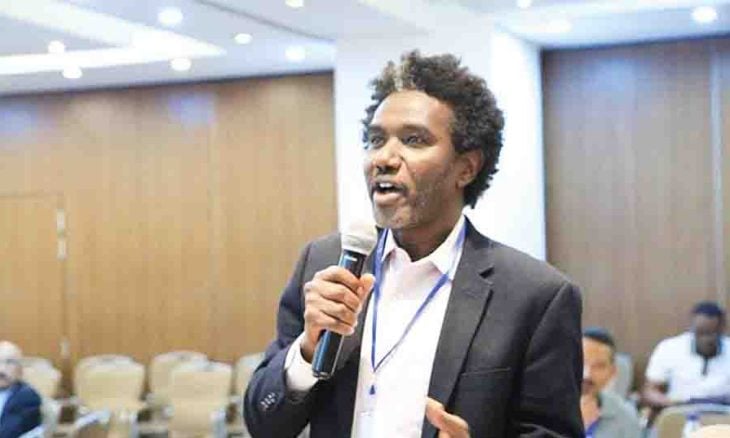
Such claims, however, are flatly denied by the Taqqadum spokesperson, Bakri al-Jak. “We have consistently said we are not aligned with any party to the conflict and that we aim to represent civilian voices that are against the war in principle as a method to settle political differences,” Al-Jak told Ayin. Claims of an RSF alignment are “purely propaganda,” designed by the former ruling party, the National Congress Party, and their Islamist backers to delegitimise Taqqadum’s calls for peace and a revived civilian-led government, he added.
Khair noted that the Rapid Support Forces (RSF) are seeking to mirror the Sudanese Armed Forces (SAF) strategy of maintaining a government structure, regardless of its dysfunction, to gain international recognition. Drawing comparisons to Somaliland and Libya’s Benghazi-based administrations, she explained how such frameworks compel the international community to engage. However, she highlighted a critical flaw in the RSF’s plan: the absence of a coherent governance project and credible leadership.
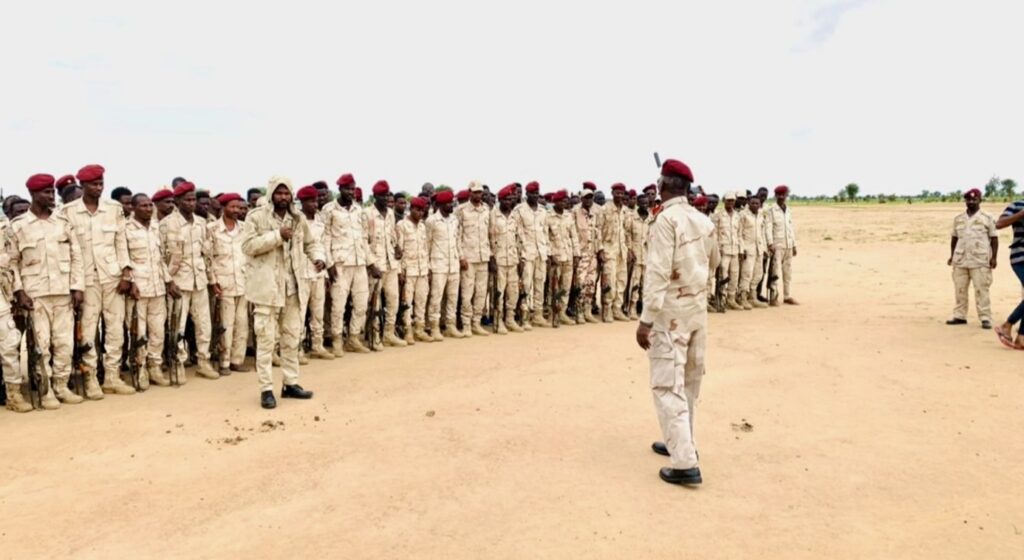
A parallel government, deeper divisions
The planned government in RSF-controlled areas aims to counter the legitimacy of the military-led administration in Port Sudan, raising fears of further division in the country.
According to Najm Al-Din Draysa, spokesperson for the United Civil Forces Alliance, the proposed government under RSF areas of control will operate within Sudan with full executive and sovereign power. “This government will issue identification documents, currency, and even maintain its own aviation, independent of the constitutional document annulled by the October 2021 military coup,” he said.
While proponents insist the authority will remain entirely civilian, they do not rule out assigning security-related ministries to RSF officers due to the government’s location in RSF-controlled areas. “The coordination between the RSF and the government will be strong to address security responsibilities,” Draysa told Ayin.
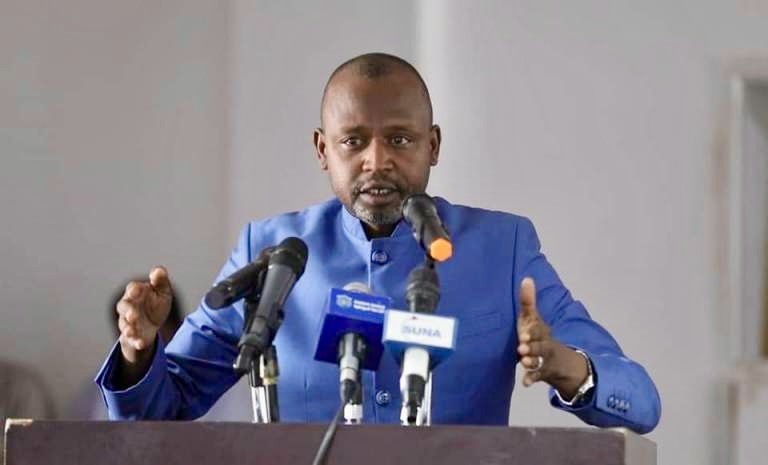
“The anticipated government will present its foundational political charter to all the revolutionary and change forces,” Al-Hadi Idris told Ayin. “Our country is experiencing a constitutional vacuum due to the ongoing war. The authorities in Port Sudan are attempting to fill this void with a government that lacks legitimacy to hinder the peace process by rejecting all initiatives and actively working to divide the country through unilateral and illegal measures, such as introducing a new currency and issuing identification documents exclusively to certain regions.”
Idris further pointed out that 60% of students in areas outside SAF control were denied the opportunity to sit for Sudanese high school certificate exams. He also criticised the implementation of discriminatory laws and targeting specific regions by airstrikes, including the recent airstrike on Kabkabyia Market, among other violations.
Concerns about the implementation of a parallel government are growing. Former information minister Faisal Mohamed Saleh warned that having two governments in Sudan would result in a de facto division of the country, similar to situations in Libya or Yemen. This would complicate peace efforts, he added.



